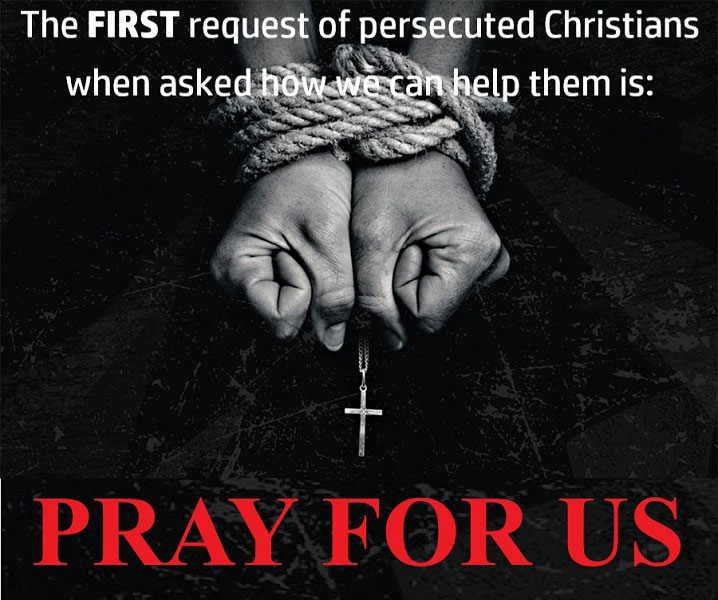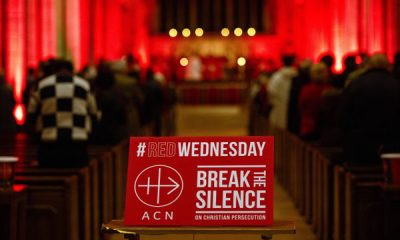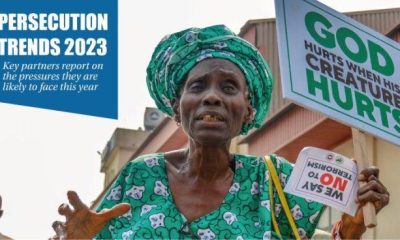world news
Why Christians Speak for the Persecuted

For some odd reason, a lumber supply store near my home likes to display the following quote on their lighted sign: “Well done is better than well said.” Perhaps the store imagines it’s in competition with the local library that is less than a mile away? More likely, the store owners are hoping to attract people who get things done by taking a shot at those who “just talk about” doing something. Doers frequent lumber stores more reliably than talkers. Doers get things done — with supplies from the lumber store.
The “doer” attitude resonates with many. Consider the various adages in our vernacular that disparage the value of speaking while extolling the virtue of action: “Actions speak louder than words,” “Talk is cheap,” “It’s a lot easier to talk about it than to do it,” or even “Put your money where your mouth is.” The doers have a well-stocked arsenal of adages.
What does the prevalence of such an armada of adages mean to those who think it’s important to speak up? This question points directly to those of us who speak on behalf of persecuted Christians, forcing the evaluation: What good is accomplished by speaking on behalf of persecuted Christians? Can anything get done by simply talking about injustices against Christians? Could greater results be achieved through action? In other words, wouldn’t “well done” be better than “well said”?
From the beginning, Christians put great confidence in speaking and preaching truth. Christians derive their conviction to speak from no one less than Christ Himself. Christ’s very identity is communicated to humankind by way of the Word. Christ is the Word of God incarnate (the Logos). In a sense, he arrived on the earth as God’s final speech to humanity. The writer of Hebrews says it this way: “In these last days God has spoken to us in His Son” (Hebrews 1). Christ is God’s word spoken to a world that desperately needs to listen.
Is God a God of the Word only? Of course not! Christ took on flesh. He grew in obedience. He suffered righteously (and unjustly). He offered himself as a sacrifice for others. He died. He rose again! He demanded obedience from all who wish to get out of this life alive. In short, he accomplished the Father’s will in word — and deed. God demands action as well as words.
To say it in a slightly different manner, God’s Justice demands action. This concept is not difficult to understand. Our own justice system demands action: Our legal system doesn’t simply say “guilty”; it also demands that actions follow in the form of sentencing that might include restitution or incarceration. So, in Christian faithfulness, words and actions both play a part. Which part is greater? How might Christians resolve the tension between talking and doing? Between speech and action?
Taking a cue from biblical accounts of creation, Christians believe that words can be actions. God said, “Let there be light,” and there was light. The words of God performed the action of creating the world (Genesis 1, John 1). Christians, therefore, place a high value on speech. Speech is action. Christian tradition is replete with powerful proclamations against injustice, as though speeches were worthy of great effort and could produce great effects. For Christians, sometimes “well said” is actually better than “well done.” The tension between speech and action reveals the profound power of the Christian faith.
Resolving the tension between speech and action does more than reveal the power of Christian speech. However, it also exposes the dreadful weakness of other worldviews. Many voices clamor to be heard. Some of these voices demand to be heard but will not (or cannot) listen, thus embracing manipulative tactics of power to stop the powerless from speaking. These tactics minimize both the value and need for words. Christians must not forsake words for oppressive actions. Instead, Christians speak truth and invite others into it. Christians speak out against those who shut down debate, deploy power, issue threats, and cause persecution.
Belief in the power of speech — or of words — is not an explicitly Christian value. However, the Christian framework is unique in that it ascribes the creation power of words to God alone. When God is removed from the conversation, people try to claim the creative power of words for themselves. Nearly eight decades ago, French playwright and philosopher Jean-Paul Sartre famously declared, “Words are loaded pistols.” Sartre’s declaration has morphed into an adage of its own, one that is popular in our cultural vocabulary. Yet, our usage of the phrase is not technically how Sartre himself used it. Like other existentialists of the mid-twentieth century, Sartre thought that individuals had the power to take aim at old ideas of the world and create constantly renewing reality through words.
When Sartre stated that words are loaded pistols, he was quoting another French thinker, Brice Parain. Sartre and Parain agreed on some points but actually disagreed on the fundamental nature of words. Sartre believed words had a utilitarian function when they were written as prose and employed for a purpose. According to Sartre, the prose writer deployed words creatively — in complete freedom — to boldly assert reality. Parain, on the other hand, was more reserved. He never wandered completely away from the traditional conviction that words possess meaning anchored somewhere transcendent in language beyond the limited human understanding.
In other words, Parain never surrendered words to their utilitarian function. He remained some distance from Sartre. For Sartre, words were signs to be utilized by the writer or speaker to enact or enforce a political ideal (he was, for a long time, a Communist). For Sartre, words force a reality crisis in the moment, cutting against (or deconstructing?) the past while compelling future change. Words are loaded in the sense — almost a God-like sense — of new creation of a revolutionary new reality.
Parain’s abiding sense of transcendence provides a better conception of words being loaded pistols. For Parain, words must have true and abiding meaning. Words are not merely calls to action. They convey meaning, and if they don’t convey meaning, then nothing in the world matters. Here is how another French writer describes Parain’s concept of words:
“Parain’s basic premise is that if language is meaningless, then everything is meaningless, and the world becomes absurd. We know only by means of words. If they are proved useless, then we are finally and irredeemably blinded” (Albert Camus, Lyrical and Critical Essays, 230).
For Christians, words are far from meaningless. Words are anchored in the divine Word. As John points out in the prologue to his gospel, “The word coming into the world enlightens everyone” (John 1:9). Human beings can communicate by words because God constructed the world by word. Further, God has designed the world and the human mind to communicate with and by His Word. God is not silent. He is speaking truth about the world, who his people are, what he demands, and what he condemns (Romans 1). As a result, no one has an excuse before God. His word is being heard — even if not obeyed.
Returning to the simple questions posed at the beginning of this article, what good are words? Is action better? Even more particularly, does it help to speak up for persecuted Christians? The answer follows the nature of God’s Word and our words. When we speak a word about injustices against God’s children, we are firing a loaded pistol, as it were, directly at the heart of unrighteousness. God’s righteousness demands that God’s people worship and serve him only. Persecution defies the righteousness of God as directly as Pharaoh defied Moses in Egypt — and ultimately leads to a similar destruction for the persecutors.
If we use words as Sartre proposed and make them mere expressions of ourselves forcing reality into existence, then we actually rob words of their power. We would be pretending to possess the God-like power to create reality through our speech acts. We would end up delusional rather than divine. We, in fact, would become less in tune with the real world and other human beings and more inclined toward a delusional life like Don Quixote, who famously jousts with windmills in a fantastic battle against non-existent giants. In other words, taking action based on our own words leads to fruitless, imaginary fighting for vainglorious conquests — having zero impact for justice or the well-being of other people.
To have a true and lasting influence on the real world, Christians must speak words against injustice and for the righteousness of God in Christ. Christians understand that everything that has come into being has done so through the power of God’s Word (John 1). Even now, everything in creation is being sustained by the same word of His power (Hebrews 1). So, what do our words accomplish? Quite a lot — if our words accord with the real world governed by the true word of God. When our words are spoken in accordance with God’s Word, then we are calling human beings to account before God and pleading with them to wake up to God.
Speaking against injustice is speaking for the right order of the real world as God created it. Such speaking puts the world on notice that the God who created all things and all people (Genesis) is the same God who is even now working all things together for his people and cataloging an account of those who oppose him, promising vengeance in the day of his wrathful return (Revelation). Between the past creation and the future recompense, God has fixed a day in which people might hear his voice and repent. Today is the day of God’s salvation! Today is the day in which our speaking words might lead to others finding regenerating faith.
What if speaking words is active participation with God? If this is the case (and it is), then our words will not return void. They will not be in vain. They will accomplish something in God’s work. Our words against persecutors and for the persecuted church speak of salvation for all who will hear and believe. Our words are a powerful blessing to the world, like those blue emergency signs on interstate highways that instruct drivers to “tune your radio to AM 510 for important emergency instructions.”
When speaking words this way, Christians demonstrate that “well said” is better than “well done.” Or, maybe “well said” is also “well done, good and faithful servants.”
Sources:persecution
world news
Christian girl rescued from forced marriage to elderly Muslim man

Pakistan — Javed Masih heaved a sigh of relief last week when he saw his 18-year-old daughter for the first time since she went missing for five months in Pakistan and was forcibly converted and married to an elderly Muslim man.
Sana Javed, 18, the youngest of seven children, had gone to a nearby shop in Lahore, Punjab Province on June 9 but never returned home.
“Our frantic search for her ended in mid-October, when I received a phone call from a Christian in Balochistan Province who informed me about her whereabouts,” said Masih, a Catholic truck driver. He would not see her again until Nov. 14.
Masih said that a Muslim woman identified only as Hafsa had befriended his daughter on WhatsApp a few days before she disappeared.
“Sana told us that the girl emotionally blackmailed and forced her to meet in person without her family’s knowledge,” Masih told Christian Daily International-Morning Star News. “She even sent her money and directed her to board a bus to Dera Ismail Khan, a city in Khyber Pakhtunkhwa Province. From there, Sana boarded another bus to cross into a remote village in Balochistan Province.”
When Sana Javed reached Hafsa’s house, she was immediately deprived of her phone and held hostage, he said.
A cleric was called, and Sana was forced to recite the Kalima [proclamation of conversion to Islam] and marry an elderly Muslim man under threats of violence,” he said. “She later found out that he was a maternal uncle of Hafsa.”
Three days after filing a report with police the same day of her disappearance, the family discovered officers had misplaced it, he said. Masih filed a new report and police registered a First Information Report (FIR), but officers made no effort to find her, he said.
“He would instead ask us to provide leads for the investigation, when in fact we neither had the information nor the resources,” Masih said.
Putting their trust in God, family members began asking others to pray along with them for her return, he said. They began visiting various pastors and churches for prayer support, and finally their prayers were answered when Masih received a call from a Christian schoolteacher in Balochistan Province identified only as Waseem. The teacher told him his daughter was in his village, and that a local politician had contacted him to help find her family.
The Muslim politician had received information from a female family member about her, Waseem told Masih.
“I do not know the man’s name, but God used him to rescue our daughter from captivity,” Masih said of the Muslim politician. “When I informed the police about my daughter’s location and sought their help, they told me that they would need official permission and resources to travel to another province. I contacted a Christian paralegal group for help, and I’m grateful that they provided us with legal and financial support to help bring Sana back to Lahore.”
A legal team from Christians’ True Spirit (CTS) accompanied police and the family to the village in Balochistan, where they recovered Sana Javed on Nov. 14, he said.
“I cannot express my gratitude for the Baloch political leader and Waseem, the schoolteacher, who not only helped us in rescuing Sana but also forced her ‘husband’ to sign an affidavit of divorce,” Masih told Christian Daily International-Morning Star News. “The Muslim [political] leader also used his influence to ensure the security of the visiting team who otherwise could have faced resistance from the hostile villagers.”
Sana Javed said she hoped others would learn from her ordeal to be cautious about befriending others on social media.
“I’m unable to explain how she managed to influence me to make this huge mistake of leaving my home,” Sana Javed told Christian Daily International-Morning Star News. “I was forced to convert to Islam and put my thumb impression on the marriage certificate. They said they would kill me if I did not obey their order.”
Prayers kept her hope of returning home alive, she said, adding that despite her circumstances, she found solace in hymns and some biblical verses that she had memorized in church.
“There were times when I would slip into depression, but then I would recite Psalms and verses, and it helped in uplifting my spirit,” she said.
The U.N.’s Human Rights Committee on Nov. 7 expressed concern about persistent reports of abduction and forced marriages of girls from minority religions, regardless of their age and prevailing law. Forced to convert to Islam under threat of violence, they suffer rape, trafficking and other forms of sexual and gender-based violence.
The U.N. body expressed concern about reports of the widespread impunity surrounding these cases.
“Victims are usually not returned to their families during investigations but forced to stay with their abductors, including members of organized criminal groups, or placed in unnecessary and inappropriate alternative care facilities, with no or limited regard for child protection standards, exposing victims to further risk of exploitation, abuse and harmful practices,” the committee stated in its concluding observations on Pakistan’s second periodic review of human rights situation earlier this month.
It urged Pakistan to intensify efforts to eradicate forced conversions and marriages, including strengthening its legal framework and enforcement mechanisms.
“The state party should also ensure that all allegations of forced conversions and forced marriages of girls are promptly, impartially and effectively investigated, that those responsible are brought to justice, and that all victims have access to effective remedies and support services such as adequate shelters, legal aid, psychological counselling and rehabilitation programs,” it stated.
Pakistan ranked seventh on Open Doors’ 2024 World Watch List of the most difficult places to be a Christian, as it was the previous year.
Sources:Christian Post
world news
പാക്ക് പീഡിത ക്രൈസ്തവര്ക്ക് വേണ്ടി സ്വരമുയര്ത്തുന്ന യുവതിക്ക് എസിഎന്നിന്റെ ധീരത അവാര്ഡ്

ലാഹോര്/ ലണ്ടന്: കൊടിയ മതപീഡനത്തിനും വിവേചനത്തിനും ഇരയായി ദുരിതങ്ങളിലൂടെ കടന്നുപോകുന്ന പാക്കിസ്ഥാനിലെ ക്രൈസ്തവര്ക്ക് വേണ്ടി ധീരതയോടെ പോരാടുന്ന യുവതിയ്ക്കു എസിഎന്നിന്റെ ധീരത അവാര്ഡ്. കത്തോലിക്ക സന്നദ്ധ സംഘടനയായ എയിഡ് ടു ദ ചര്ച്ച് ഇന് നീഡ് (എസിഎന്) ഏര്പ്പെടുത്തിയ അവാര്ഡിന് റിബ്ക നെവാഷ് എന്ന യുവതിയാണ് അര്ഹയായിരിക്കുന്നത്.
ക്രൈസ്തവ സ്ത്രീകൾക്കും പെൺകുട്ടികൾക്കും നീതി ലഭിക്കുന്നതിനു വേണ്ടി ശബ്ദമുയർത്തുന്നതിൽ അസാമാന്യ തീക്ഷ്ണത കാണിക്കുകയും ക്രൈസ്തവരോടുള്ള അനീതിയ്ക്കെതിരെ ശക്തമായി പോരാടുകയും ചെയ്യുന്ന റിബ്കയുടെ ധീരതയാര്ന്ന നിലപാട് കണക്കിലെടുത്താണ് ‘കറേജ് ടു ബി ക്രിസ്ത്യൻ അവാര്ഡ്’ നല്കുന്നതെന്ന് എസിഎന് വ്യക്തമാക്കി.
24 വയസ്സു മാത്രം പ്രായമുള്ള നെവാഷ് പാക്കിസ്ഥാനിലെ ക്രൈസ്തവ സ്ത്രീകളുടേയും പെൺകുട്ടികളുടേയും ദയനീയാവസ്ഥയെക്കുറിച്ച് തുറന്നുപറയുകയും തട്ടിക്കൊണ്ടുപോയി ഇസ്ലാം മതത്തിലേക്ക് പരിവർത്തനം ചെയ്യുന്ന അനീതിയ്ക്കെതിരെ ശക്തമായി സ്വരമുയര്ത്തുകയും ചെയ്തിരിന്നു. അക്രമാസക്തമായ പീഡനങ്ങളെ അതിജീവിച്ചവരെ സമൂഹത്തിലേക്ക് മടക്കിക്കൊണ്ടുവരുവാനും അവരുടെ ശബ്ദമായി മാറാനും ഈ യുവതി തന്റെ യൗവനം മാറ്റിയിരിക്കുകയാണ്. 2023 ഓഗസ്റ്റിൽ പാക്കിസ്ഥാനിലെ പഞ്ചാബ് പ്രവിശ്യയിലെ ജരന്വാലയില് അരങ്ങേറിയ ക്രൈസ്തവ വിരുദ്ധ കലാപത്തില് സര്വ്വതും നഷ്ട്ടപ്പെട്ട ക്രൈസ്തവര്ക്കു നീതി ലഭിക്കണമെന്ന് ആവശ്യപ്പെട്ട് നിരവധി പത്രസമ്മേളനങ്ങളിൽ അവർ പങ്കെടുത്തിട്ടുണ്ട്.
പാകിസ്ഥാനിലെ പീഡിത സഭയ്ക്കുവേണ്ടി വാദിക്കുന്ന അസാധാരണമായ ശക്തിയും ധൈര്യവും നിശ്ചയദാർഢ്യവും പരിഗണിച്ച് റിബ്ഖയ്ക്ക് അവാര്ഡ് നല്കുന്നതില് ഏറെ സന്തോഷമുണ്ടെന്ന് എസിഎന് യുകെയിലെ ദേശീയ ഡയറക്ടർ ഡോ. കരോലിൻ ഹൾ പറഞ്ഞു. 2024-ലെ ക്രിസ്ത്യൻ അവാർഡിന് തിരഞ്ഞെടുക്കപ്പെട്ടതിൽ ബഹുമാനവും നന്ദിയും അറിയിക്കുന്നുവെന്നും പീഡിത ക്രൈസ്തവരെ സഹായിക്കാൻ തന്നാൽ കഴിയുന്നതെല്ലാം ചെയ്യുമെന്നും റിബ്ക നെവാഷ് പ്രതികരിച്ചു. പീഡിപ്പിക്കപ്പെടുന്ന ക്രൈസ്തവരെ പ്രത്യേകം അനുസ്മരിക്കുന്ന റെഡ് വെനസ്ഡേ ആചരണത്തിന്റെ ഭാഗമായി ഇന്നലെ ലണ്ടനിലെ ബ്രോംപ്ടൺ ഓറട്ടറിയിൽവച്ച് റിബ്ക നെവാഷിന് അവാർഡ് സമ്മാനിച്ചു.
കടപ്പാട് :പ്രവാചക ശബ്ദം
world news
ദുബൈയില് ടൂറിസ്റ്റ്, സന്ദര്ശന വിസകള്ക്ക് ഹോട്ടല് ബുക്കിങ്ങും റിട്ടേണ് ടിക്കറ്റും നിര്ബന്ധമെന്ന് ദുബൈ എമിഗ്രേഷന്

ദുബൈ: എമിറേറ്റിലേക്ക് ടൂറിസ്റ്റ് വിസയും സന്ദര്ശന വിസയും ലഭിക്കാന് ഇനി മുതല് ഹോട്ടലില് റൂം ബുക്ക്ചെയ്തതിന്റെ രേഖയും റിട്ടേണ് ടിക്കറ്റും നിര്ബന്ധമാക്കിയതായി ദുബൈ എമിഗ്രേഷന് അറിയിച്ചു. വിസക്കായി അപേക്ഷിക്കുമ്പോള് ക്യൂആര് കോഡുള്ള ഹോട്ടല് ബുക്കിങ്ങിന്റെ രേഖയും തിരിച്ചുപോകാനുള്ള വിമാന ടിക്കറ്റിന്റെ പകര്പ്പും സമര്പ്പിക്കണമെന്നാണ് ദുബൈ എമിഗ്രേഷന് ട്രാവല് ഏജന്സികള്ക്ക് ഇത് സംബന്ധിച്ച് നിര്ദേശം നല്കിയിരിക്കുന്നത്.
ഒരു മാസത്തെ വിസക്കായി അപേക്ഷിക്കുന്നവരുടെ ക്രെഡിറ്റ്/ഡെബിറ്റ് കാര്ഡുകളില് 3,000 ദിര്ഹത്തിന് സമാനമായ തുകയും രണ്ടു മാസത്തെ വിസക്ക് അപേക്ഷിക്കുന്നവരുടെ കാര്ഡില് 5,000 ദിര്ഹത്തിന് തുല്യമായ തുകയും ഉണ്ടായിരിക്കണം. അതേ സമയം യുഎഇയില്കഴിയുന്ന വ്യക്തി സ്വന്തം കുടുംബത്തിനായി സന്ദര്ശക വിസക്ക് അപേക്ഷിക്കുമ്പോള് ഹോട്ടല് ബുക്കിങ്ങും റിട്ടേണ് ടിക്കറ്റും സമര്പ്പിക്കേണ്ടതുണ്ടോയെന്ന കാര്യത്തില് വ്യക്തതവരേണ്ടതുണ്ട്.
ടൂറിസ്റ്റ് വിസക്കായി രാവിലെ അപേക്ഷിക്കാന് ശ്രമിച്ചപ്പോള് റിട്ടേണ് ടിക്കറ്റ് രേഖകള് അപ്ലോഡ് ചെയ്യാന് എമിഗ്രേഷന് സൈറ്റില് ആവശ്യപ്പെട്ടതായി ദുബൈയിലെ വിവിധ ട്രാവല് ഏജന്സികളില് പ്രവര്ത്തിക്കുന്നവര് വ്യക്തമാക്കി. രേഖകള് സമര്പ്പിക്കാത്ത ഒട്ടേറെ വിസാ അപേക്ഷകള് പ്രോസസിങ് പൂര്ത്തിയാവാതെ കിടക്കുന്ന സ്ഥിതിയാണെന്നും ഇവര് പറയുന്നു.
Sources:Metro Journal
-

 Travel6 months ago
Travel6 months agoയാക്കൂസ കരിഷ്മ:ഓല സ്കൂട്ടറിനേക്കാൾ വിലക്കുറവിൽ കുഞ്ഞൻ കാർ; സിറ്റി യാത്രകൾക്ക് ഇനി ഇവൻ മതിയാവും
-

 Tech4 months ago
Tech4 months agoചിത്രങ്ങൾ എഡിറ്റ് ചെയ്യാം; വാട്സ്ആപ്പിലെ ‘നീല വളയം’ സ്മാർട്ടാകുന്നു, കാര്യമായ മാറ്റങ്ങൾ
-

 National9 months ago
National9 months agoനെയ്തേലിപ്പടി ക്രൂസേഡിന് അനുഗ്രഹീത സമാപ്തി
-

 Movie8 months ago
Movie8 months agoActor Ryan Phillippe ‘Craving’ Relationship With God After Movie About Christian Missionary
-

 National9 months ago
National9 months ago300,000-Member Indian Church to Plant 40 More Megachurches
-

 Movie11 months ago
Movie11 months agoBrazilian gospel singer Pedro Henrique dies of heart attack after collapsing on stage
-

 Articles5 months ago
Articles5 months ago8 ways the Kingdom connects us back to the Garden of Eden
-

 Hot News8 months ago
Hot News8 months ago3 key evidences of Jesus’ return from the grave























